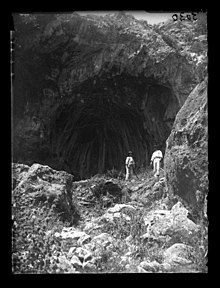Cova Negra is an archaeological site near the town of Xàtiva in the Province of Valencia, Spain, with remains that show sporadic and short-term occupation by Neanderthals in the Mousterian period.[1]
 Cova Negra, 1928 | |
| Region | Province of Valencia |
|---|---|
| Coordinates | 38°57′54″N 0°29′47″W / 38.965046°N 0.496271°W |
| Type | Intermittent settlement |
| History | |
| Periods | Mousterian |
Location and description
editThe cave is located in a valley alongside the Albaida river, and an area of 57 hectares around the cave was declared a Cultural Heritage Site. Since 2006 the site is a Municipal Natural Site, also named Cova Negra.
Archaeological finds
editThe Neanderthals who occupied the area were avid eaters of birds; 247 remains of 18 different bird species were found, especially doves and choughs.[2] Bird consumption in Cova Negra and other caves such as Cueva de Bolomor, Gorham's Cave, and Ibex Cave, prove that the northwestern part of the Mediterranean saw widespread exploitation of "small, fast game".[3]
In 2013, a fragment from an adult parietal bone were found, a cranial fragment from a child, and a child's premolar. By that time, the cave had 25 pieces of Neanderthal remains (seven individuals in all), including many of children (one a teenager, four children).[4] A study carried out in 2019 provided the first ESR / U-Th chronology for the Cova Negra site and indicates that Neanderthals occupied this site during MIS 8–6, between 273 ± 26 ka and 146 ± 34 ka. These results suggest that human occupation took place at the end of the Middle Pleistocene, and hence it is older than proposed by previous thermoluminescence ages obtained on sediments.[5]
History and research
editThe site was discovered by the priest G. Viñes in 1933.[6]
Gallery
edit-
Silex tools found in the Cova Negra
-
Parts of parietal bone from an adult Neanderthal
See also
editReferences
editNotes
edit- ^ Arsuaga et al. 2007.
- ^ Martínez Vallea, Guillem Calatayuda & Villaverde Bonilla 2016.
- ^ Morin et al. 2019.
- ^ Hallados nuevos restos de neandertal 2013.
- ^ Richard, M.; Falguères, C.; Pons-Branchu, E.; Foliot, L.; Guillem, P.M.; Martínez-Valle, R.; Eixea, A.; Villaverde, V. (2019). "ESR/U-series chronology of early Neanderthal occupations at Cova Negra (Valencia, Spain)". Quaternary Geochronology. 49: 283–290. doi:10.1016/j.quageo.2018.05.004. S2CID 134242257.
- ^ Gibbons & Moreno 2002, p. 346.
Bibliography
edit- Arsuaga, J.L.; Villaverde, V.; Quama, R.; Martínez, I.; Carretero, J.M.; Lorenzo, C.; Gracia, A. (2007). "New Neandertal remains from Cova Negra (Valencia, Spain)". Journal of Human Evolution. 32 (1): 31–58. doi:10.1016/j.jhevol.2006.07.011. PMID 16979220.
- Gibbons, Wes; Moreno, Teresa, eds. (2002). The Geology of Spain. Geological Society of London. ISBN 9781862391277.
- "Hallados nuevos restos de neandertal en la Cova Negra de Xàtiva". El País. 29 October 2019. Retrieved 16 August 2019.
- Martínez Vallea, Rafael; Guillem Calatayuda, Pere M.; Villaverde Bonilla, Valentín (2016). "Bird consumption in the final stage of Cova Negra (Xátiva, Valencia)". Quaternary International. 421: 85–102. Bibcode:2016QuInt.421...85M. doi:10.1016/j.quaint.2016.01.068.
- Morin, E.; Meier, J.; El Guennouni, K.; Moigne, A.-M.; Lebreton, L.; Rusch, L.; Valensi, P.; Conolly, J.; Cochard, D. (2019). "New evidence of broader diets for archaic Homo populations in the northwestern Mediterranean". Science Advances. 5 (3): eaav9106. Bibcode:2019SciA....5.9106M. doi:10.1126/sciadv.aav9106. PMC 6402852. PMID 30854435.